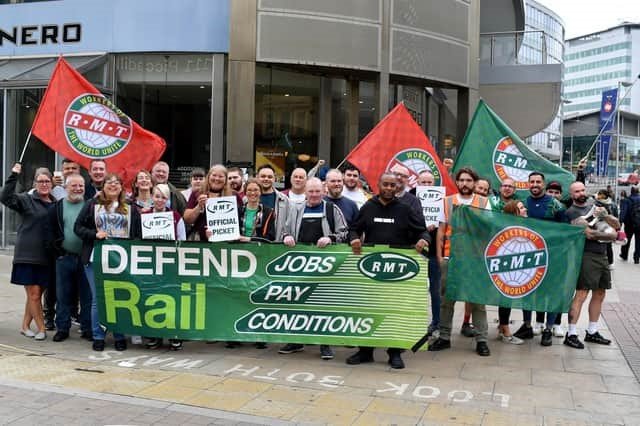Ashok Kumar, Joint Secretary, Kamgar Ekta Committee (KEC)

We have already been reporting strikes by the railway workers of UK. Please refer to https://aifap.org.in/6341/ (Train drivers in England and Scotland struck work on 13th August 2022 for pay rise to offset soaring food and fuel prices, August 17, 2022 Aifap Admin Posts) and https://aifap.org.in/6362/ (Repeated strikes by UK rail workers continue, August 22, 2022 AifapAdminPosts): “Over 45,000 rail workers in the UK, members of the Rail, Maritime and Transport Workers union (RMT) and Transport Salaried Staffs Association (TSSA), went on another round of national strikes this week on Thursday 18 August and on Saturday 20 August”.
Around 40,000 rail workers again struck work on Saturday, 8 October for wage rise they have been fighting for the last many months.
These strikes have been occurring regularly for the past two months, with no resolution so far. What do these strikes teach us about the capitalist system in general? What lessons can we draw for India in particular?
Can anyone deny that the labour of workers, farmers and toiling people is vital to the well-being of society and its progress? How many of us can survive without the work that produces our food, clothing, housing and so on? What would our life be like without electricity, means of transport, health, education, IT services and so on?
Then if our labour is so vital, should we not expect progress and increasing prosperity over the years? Should not our working conditions improve?
In India we know that what is happening is actually the opposite. It may surprise a few of us to know that in this matter, India is no exception. Workers in so called “rich” countries like UK, USA and those in Europe are also facing price rise, job cuts, worsening conditions of work, insecurity of service, and so on.
In the UK, as in India, rail workers ae relatively better off, but even they have to fight to maintain their living standards (which are by no means very high in the first place). They were offered a pay increase of just 4% per year, when the annual inflation is over 10% and rising. What does this mean in practice?
Let us take for the sake of example, a worker who earned £1000 pounds a month last year. By tightening his belt, he and his family spent that money on absolute necessities. This year he would get £1040 a month if he took the offered rise. However he would no longer be able to afford all the absolute necessities that he bought last year, because now he would have had to pay the inflated cost of £1100 for them. This just means that he would actually be poorer than before!
To add insult to the injury, the offered pay increase comes with the condition that workers accept 2,000 job losses well as major changes in terms and conditions. This would mean more night shifts—40 weeks of nights a year. That would impact people’s physical, mental and emotional health as well as social lives massively. No wonder that they have to fight!
This is not an imaginary situation. There are growing numbers of workers in these countries who have to survive on one meal a day and further, because of the tremendous increase in gas price, in winter they will have to choose between slowly starving to death or freezing to death!
In the UK, striking workers are labelled by the monopoly owned media as Putin’s stooges (Russia’s chamchas). Aren’t people fighting for their rights in India labelled as Pakistanis, Khalistanis, gaddars (traitors), andolanjeevis (professional agitators) and so on?
Why is it happening?
The fact is that every country ruled over by the capitalist class, even those that have democracy, have the following common features:
- The gap between the capitalists (especially the monopoly capitalists) and the others is growing
- Governments of the parties in power strive to help the monopolies.
- Monopolies thrive even in crises like the recent pandemic; their wealth increases rapidly.
- Workers never win any rights without united struggle.
- Workers have to fight just to stay where they are.
As in India, an increasing number of workers are being hired on contract. Their capacity to fight is limited. But it is very heartening that the railway (as well as other) workers in UK are fighting resolutely. The struggle of workers anywhere in the world is a source of inspiration to workers everywhere!
